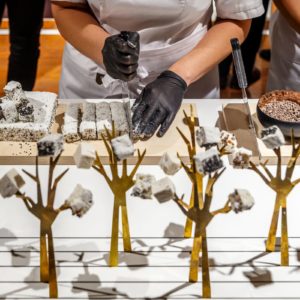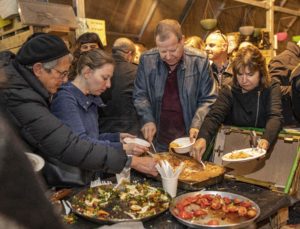Open Restaurants festival welcomes renowned Turkish chef as Jerusalem looks to food for tourism boost
On a cold November night, dozens of visitors slowly file into an opening in the ancient stone walls of Jerusalem’s Old City.
Walking down candlelit steps with wine glasses in their hands, they make their way through a large cavern as performance artists dance nearby and light projections illuminate the walls. Yet there are no magic lamps or genies inside this legendary space known as Zedekiah’s Cave; rather, the treasure these visitors seek is of the gastronomic variety.
For the inaugural event of this year’s Open Restaurants culinary festival in Jerusalem, an Aladdin-themed feast was held in the unique limestone quarry hidden beneath the Old City’s Muslim Quarter. Believed to be where Herod the Great sourced limestone to renovate the Second Temple, the space was carved out over a period of several millennia – and became an ideal location for a Middle East-style banquet, where chefs served hundreds of hungry guests on plates heaped high with spiced chicken, rice, kofta and freshly made hummus.
With more than 100 culinary events taking place over five days, Jerusalem’s 2019 Open Restaurants festival gave even the most demanding palates something satisfying to taste.
Turkey’s Aret Silahli, who specializes in Turkish-Greek-Armenian cuisine and owns a successful tapas restaurant in Istanbul named Aret’in Yeri, collaborated with Israeli chef Nadav Malin to prepare the sumptuous meal in Zedekiah’s Cave.
“This is such a good festival and I’m very, very happy here,” Silahli told The Media Line. “[Jerusalem] is a beautiful city.”
Malin, considered the go-to person for Israel’s “slow food movement,” concurred, calling the festival “a really amazing and tasty way to show the culture and history of the city.”
Open Restaurants, launched in Tel Aviv in 2014, has since expanded to Jerusalem and grown into a highlight of the city’s culinary calendar. This year’s event was held November 19-23.
Offering private tours, hands-on workshops and meetings with renowned chefs in restaurants and cultural venues, the festival highlights the city’s multicultural heritage and combines food with art and technology.
“It started as an idea to go and take a peek behind the best restaurants and meet the chefs and learn their secrets,” Open Restaurants founder Merav Oren told The Media Line. “But when we came to Jerusalem, it expanded and became an urban culinary festival that combines everything, [including] art, design, innovation, tech and so on.”
Oren notes that the culinary scene in the city has greatly benefitted from the annual event.
“Today, there’s so much street food and fine dining [as well as] bistros, cafes and wine places,” she stressed, adding that she would love to expand the festival to locations outside Israel.
An Open Restaurants event that brought together designers, food scientists and chefs was EatTech, an exhibition focusing on the future of food and showcasing innovative trends in the restaurant industry. It featured edible displays and experimented with new ways to use plant-based ingredients such as seaweed and chickpea protein.
“We gave the chef a challenge in how to make [spirulina] tastier,” said Carmit Oron, the co-founder and CEO of ACT (Art, Culinary and Food Tech), a platform aimed at connecting food tech startups with chefs.
“We prepared a spirulina sponge cake topped with a spirulina-coconut mousse that was green. It was very good,” Oron, who is also the general manager for Open Restaurants, told The Media Line.
The edible exhibition at EatTech also included marshmallows made out of chickpea powder, and other products made from nutritional, high-protein ingredients seldom used in traditional cooking.

Marshmallows made with chickpea powder are served up at the EatTech event. (Nimrod Genisher/Open Restaurants)
Another special event examined how to prepare a meal from ingredients that are about to end their shelf life, the idea being to prevent food waste and encourage sustainable practices. It was overseen by Malin.
“For me, food is my life, but for others, food has a cultural impact,” he told The Media Line. “It’s about history and traditions, but also about innovation and creating new things.”

People gather for a festive meal as Jerusalem chefs demonstrated how to prepare a meal from soon-to-be expired ingredients. (Itay Selikter/Open Restaurants)
Similar dining events are held in cities around the world and have grown increasingly popular over the years. However, Oron believes that Israel’s Open Restaurants is unique because the menus change each year, and events are curated according to a specific theme.
“In a world where we’re disconnected because of technology – everybody is looking at their phone screens all the time – what food creates is bonding,” Oron said. “Eating has always been a social [activity] and is one of the few opportunities where we can actually bond.”
In Jerusalem, the municipality is hoping that Open Restaurants will be a boon not only for foodies and restaurateurs, but also for tourism.
“In a city that was [once] suffering from a very bad image, we needed to create a positive image,” Ilanit Melchior, director of tourism at the Jerusalem Development Authority, told The Media Line.
“We were looking really deeply into the community [to find] our strongest points, and food was one of them,” she said. “We’ve managed to grow tourism to the city by 47 percent in 10 years, so it’s quite a big achievement.”
A record-breaking 3.7 million people visited Israel in the first 10 months of 2019, marking a 10% increase over 2018, according to Israel’s Central Bureau of Statistics.